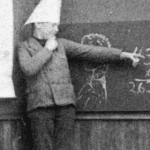Editors' Note: This article is part of the Patheos Public Square on Best Practices for Peace in 2015. Read other perspectives here.
I am a firm believer in the power of words.
To increase peace in the world, we need to speak peace, and not peace through victory, but rather peace through understanding and acceptance. Our goal is more than tolerance; tolerance means, "I still do not like you, but I grudgingly accept that you will not disappear any time soon." Acceptance, by contrast, means acknowledging both difference and legitimacy. To lay the groundwork for this kind of peace, there is one sentence we can all practice saying when it is true: "You were right, and I was wrong."
Over the course of our lives, or even in a typical week, there are moments when we are clearly, factually, demonstrably wrong — I remembered a date wrong, I was in fact the person who left the door open. When we are clearly wrong, it can be hard enough to admit it. But saying, "I was wrong" is only half of the story, and maybe the easier half; what if I was wrong, and at the same moment you were right, and I know it?
Why is it so hard to say, "You were right, and I was wrong"? It is a public admission of failure to the very person with whom you were arguing. When we argue a particular position, we convince ourselves of the justice of our cause, and we become emotionally invested in our success; we can be so invested that we refuse to admit when we've really lost. The greatest challenge with "you were right, and I was wrong" is that it feels as if there's no self-defense, no preservation of honor. Our instinctive response when cornered is to attack on another front — not conceding our error, we change the subject. On Yom Kippur, the Jewish "Day of Atonement," one is expected to seek out those people one has wronged to ask their forgiveness. And those who have been wronged should even make themselves available to those who need to apologize! Neither is easy, of course, and this need is deeper than once a year. All the more reason to take the opportunities to practice that inevitably arise.
When the situation next arises, try saying "you were right, and I was wrong" with someone you trust, a spouse or close friend — these kinds of disagreements come up all the time with friends and spouses! Ideally, their response will be a simple "thank you," and in the future they can concede to you when you are right, and together you can work on fixing problems rather than bearing a grudge. Remember, if we say "you were right and I was wrong" about one issue, we are not saying "you are always right and I am always wrong." Admitting that targeted detail can work wonders in moving life forward.
See what happens when you say it; often, the argument just ends. Why? You've validated the other person, you encouraged them to trust you and to feel that you're on the same team. Being willing to admit when you are wrong makes you more believable when you are right. And you look at yourself differently: you feel more mature, a person of self-confidence, as if you had said, "I am strong enough to concede when I am wrong; can you?" Most importantly, you have the satisfaction of facing the truth even if it is personally uncomfortable — an important part of personal dignity.
Building positive experiences with "you were right and I was wrong" helps us say it even in the hardest circumstances — those moments when we are concerned that someone will use our concession against us, someone who might respond, "Darn right you were wrong, and you were also wrong about this and that and the other thing too." Our concession can still have positive effects down the road when tempers cool. But saying "you were right and I was wrong" is not only about the effect on others; it is also about how we think about ourselves. If we can admit when we are truly wrong, then continuing a grudge is their poor choice. Saying the truth, even if it hurts us, helps our dignity. It confirms that we live by our moral compass, not by ego preservation.
It is absolutely delightful when someone else admits, "you were right and I was wrong," but if you demand that someone else say it, you are really insisting "I was right and you were wrong." That is all too easy to say, and it builds no bridges, deepens no trust, creates no common ground. We are responsible for our own behavior; we are responsible for our own choices. If we choose the wiser course of not wasting time and ego on arguments we have already lost, that is our wisdom to face reality. If others insist on their position after evidence proves otherwise, our wisdom is to be able to move forward without a concession they are unable to give.




